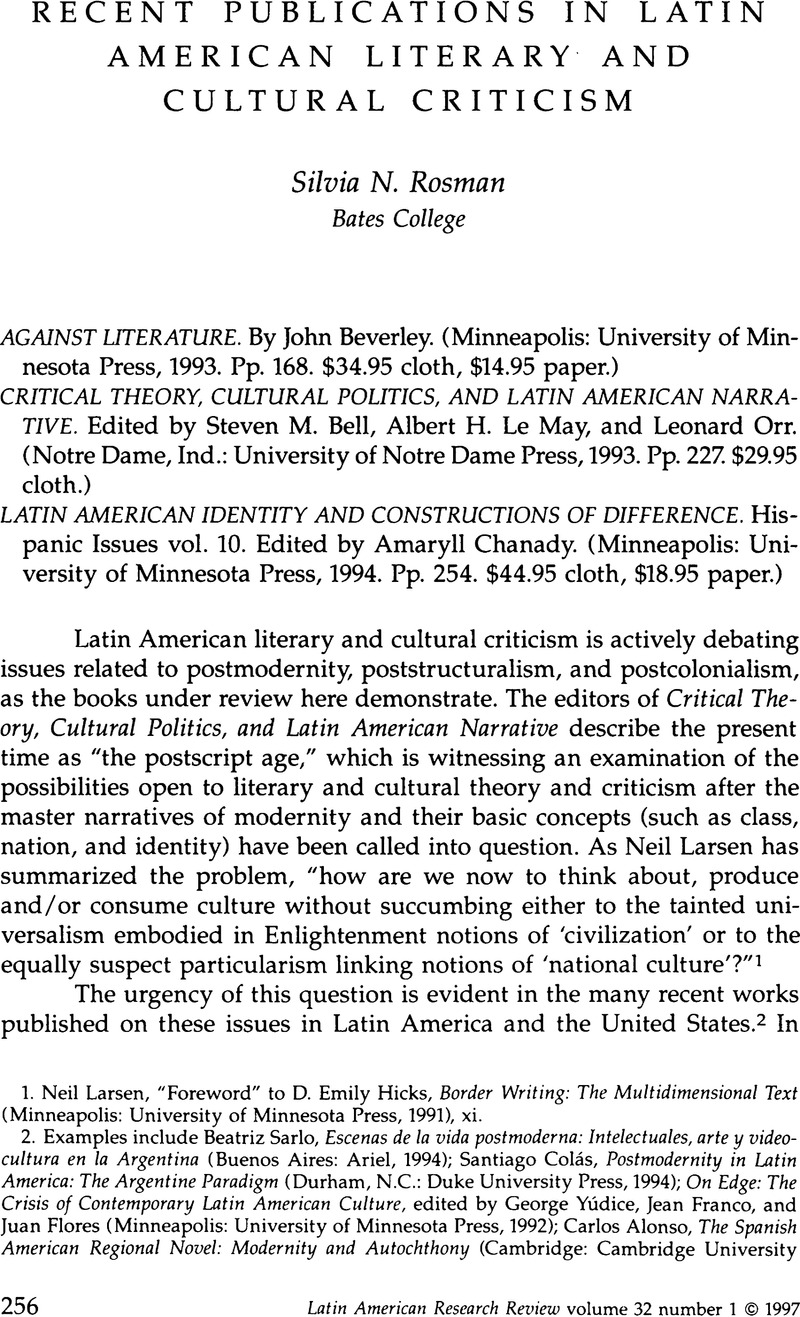No CrossRef data available.
Article contents
Recent Publications in Latin American Literary and Cultural Criticism
Review products
Published online by Cambridge University Press: 05 October 2022
Abstract

- Type
- Review Essays
- Information
- Copyright
- Copyright © 1997 by the University of Texas Press
References
Notes
1. Neil Larsen, “Foreword” to D. Emily Hicks, Border Writing: The Multidimensional Text (Minneapolis: University of Minnesota Press, 1991), xi.
2. Examples include Beatriz Sarlo, Escenas de la vida postmoderna: Intelectuales, arte y videocultura en la Argentina (Buenos Aires: Ariel, 1994); Santiago Colás, Postmodernity in Latin America: The Argentine Paradigm (Durham, N.C.: Duke University Press, 1994); On Edge: The Crisis of Contemporary Latin American Culture, edited by George Yúdice, Jean Franco, and Juan Flores (Minneapolis: University of Minnesota Press, 1992); Carlos Alonso, The Spanish American Regional Novel: Modernity and Autochthony (Cambridge: Cambridge University Press, 1990); Antonio Benítez Rojo, La isla que se repite: El Caribe y la perspectiva postmoderna (Hanover, N.H.: Ediciones del Norte, 1989); Julio Ramos, Desencuentros de la modernidad en América Latina: Literatura y política en el siglo XIX (Mexico City: Fondo de Cultura Económica, 1989); and recent issues of Boundary 2, Revista de Crítica Literaria Latinoamericana, and Nuevo Texto Crítico.
3. George Yúdice, “Postmodernity and Transnational Capitalism,” On Edge, 12.
4. For a recent discussion of such practices in the work of Ernesto Laclau and Drucilla Cornell, see Judith Butler, “Poststructuralism and Postmarxism,” Diacritics 23, no. 4 (Winter 1993):3–11.
5. Françoise Perus echoes Piglia's concern in “Modernity, Postmodernity, and Novelistic Form in Latin America,” her contribution to Latin American Identity and Constructions of Difference: “We will have to determine … whether postmodernity does not run the risk of relegating political discourse, and politics itself, to pure fiction (in the traditional sense of the term), thus returning to a magical-mythical conception of language” (p. 46). Moreiras's review of Perus's essay in the same volume comments: “Perus proves that it is not the postmodern, as she understands it, that will fictionalize politics. On the contrary, modernity, by presenting itself as the myth of the termination of myths, was responsible for a technologizing conception of language whose magico-mythical horizon was all the more powerful for being hidden from view under the disguise of Enlightened universality” (p. 221).
6. Fredric Jameson, “Third World Literature in the Era of Multinational Capitalism,” Social Text, no. 15 (Fall 1986):65–88.
7. See Aijaz Ahmad, “Jameson's Rhetoric of Otherness and the ‘National Allegory,‘” Social Text, no. 17 (Fall 1987):3–25.
8. Argentine critic Beatriz Sarlo raises a similar concern (albeit from a different critical position) in her recent book Escenas de la vida postmoderna: Intelectuales, arte y videocultura en la Argentina (Buenos Aires: Ariel, 1994). In this work, she analyzes the relation between art and video culture, which she considers different spheres that should not be equated, and the possibilities for democratic access to them. Sarlo is also concerned with how popular culture can be defined in the present technological juncture and how popular cultures process the “cultural goods” of the market.
9. Critic Barbara Johnson responded to this concern in her introduction to the 1992 Oxford Amnesty International Lectures: “Our lecturers are being asked to consider the consequences of the deconstruction of the self for the liberal tradition. Does the self constructed by the liberal tradition still exist? If not, whose human rights are we defending?” See “Introduction,” Freedom and Interpretation (New York: Basic Books, 1992), 2. A recent interpretation of the political agency of testimonio appears in Santiago Colás, “Of Creole Symptoms, Cuban Fantasies, and Other Latin American Postcolonial Ideologies,” PMLA 110, no. 3:382–96.
10. Jameson, “Third World Literature in the Era of Multinational Capitalism,” 78. Beverley comments on testimonio's shift from self to collective expression in this manner: “Testimonio is an affirmation of the authority of a single speaking subject, even of personal awareness and growth, but it cannot affirm a self-identity that is separate from a group or class situation marked by marginalization, oppression and struggle. If it does this, it ceases to be testimonio and becomes autobiography. If [Rigoberta Menchú] had become a writer instead of remaining as she has a member of and an activist for her ethnic community, her narrative would be autobiography …” (Beverley, p. 83).
11. According to Paz, “Today we witness the twilight of the aesthetics of rupture; the art and literature of our turn of the century have gradually lost their powers of negation. For a long time now their negations have been ritualistic repetition, their rebellions formulas, their transgressions ceremonies.” Octavio Paz, “El romanticismo y la poesía contemporánea,” as cited by Yúdice in “Postmodernity and Transnational Capitalism,” On Edge, 26.




